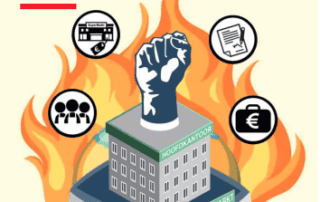Franchising is serious business
Franchise practice is characterized by a wide variety of issues that manifest themselves in it. Sometimes there are small trends in this. A somewhat recent example of this is the phenomenon of what I call the miniature franchisor: a franchise organization with one or two franchisees, which in many cases also does not operate its own branches. In most cases, such organizations are simply too small to function as a serious franchise organization. After all, franchising presupposes economies of scale, joint purchasing and, based in part on the European Code of Honor on Franchising, a proven formula for success. With perhaps a few exceptions, in most cases this is really impossible when a franchise organization consists of one, two or three franchisees and nothing more.
It goes without saying that a franchise organization may have a small size in a start-up phase. However, also pursuant to the European Code of Honor on Franchising, the franchisor must, in principle, have one or more pilot branches operational, among other things in order to meet the ‘proven success formula’ criterion. In addition, every small franchisor can then test for himself, also in the longer term, to determine whether his formula works. Practice shows that when there are no such pilots, a situation quickly arises in which the few franchisees de facto maintain and subsidize the person or persons of the franchisor, without the formula concerned offering any real added value. The franchisees involved are often also recruited with premonitions that the franchise organization would become very large in the short term, something that turns out to be quite different in practice.
In principle, depending on the circumstances, franchisees confronted with such an organization have various legal remedies available. Unfortunately, the question of whether that is the case appears to us to be settled in practice, now that the above-described disadvantages of a very small franchise organization almost always manifest themselves in practice and, in short, nothing is earned by the franchisees involved. Particularly if the picture at the time of entering into the franchise agreement was rosy and, for example, predicted a strong growth of the franchise organization, it is possible under certain circumstances to invoke the annulment of the franchise agreement with retroactive effect and compensation for error. In the second instance, the legal ground of attributable shortcoming could also be used in order to obtain compensation and dissolution of the franchise agreement. However, in most cases it will probably not come to any compensation or compensation, now that the financing basis of the franchisor involved also often leaves much to be desired and therefore, to put it unparliamentarily, there is nothing to be gained.
Again: franchising is serious business. Everyone should be wary of frivolous start-ups, which have not sufficiently thought about the future and the growth potential. Such a responsibility lies primarily with the franchisor, but (potential) franchisees would also do well to convince themselves of the viability of their franchise organization, ideally before concluding the franchise agreement.
Ludwig & Van Dam franchise attorneys, franchise legal advice

Other messages
Post non-competition ban without a signed franchise agreement
Is a franchisee bound by a post-competition ban without a ...
Post non-compete clause in hard franchising
The summary proceedings judge of the Amsterdam District Court ...
Does an agreed rent indexation always apply?
Many entrepreneurs were confronted with a significant rent increase ...
Ludwig & Van Dam in Distrifood Magazine about the Franchise Act
Interview about the current obstacles for independent supermarket entrepreneurs and ...
No franchise agreement, but membership of a cooperative
In certain cases, agreements made in a franchise agreement may ...
Post prohibition of competition and transfer of the business to the life partner
A franchisee is a company. The franchisee and the private ...







